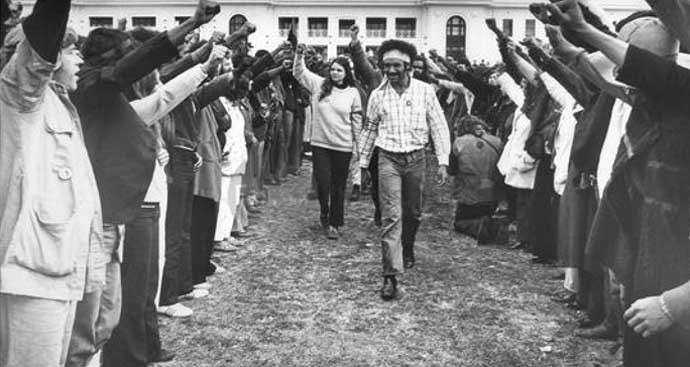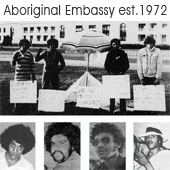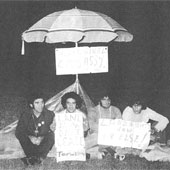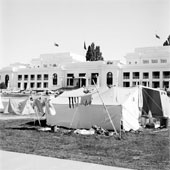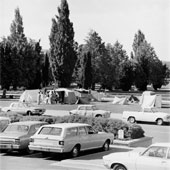Five attempts on my life, character assassination, to push government agendas
Ghillar, Michael Anderson, counters the most recent defaming detractors:
NO, in 1972 I did not leave the Aboriginal Embassy in Canberra 'a shamed man' and YES, I did lead the march of thousands in 22 July 1972 against the removal of the Aboriginal Embassy by police. The documentary Ningla A-Na (Hungry For Our Land) records this historic event.

Exposing defamation – truth prevails
Ghillar, Michael Anderson 22 June 2017
Because of the recent chatter and defamation of me personally I do wish to make a comment on the latest post [21 June 2017] on the Aboriginal Tent Embassy Facebook page administered by Alice Haines and Serene Fernando. This Facebook page has got its following. Unfortunately the administrators and a handful of people are abusing the page, which is a standard strategy to divide and conquer. This is in opposition to the purpose of the Aboriginal Embassy, which is to unite our people through a common cause.
There are a few who are using this platform to pursue the agenda to character assassinate me personally, and to discredit the core purpose of the Sovereign Union. This is not the first time I have ever been character assassinated. Previously, it was by way of private telephone conversations with parties close to government, pushing government agendas by creating false rumours and accusations about my character and trustworthiness. The Hidden Hand works in many ways through sinister global networks, and is attempting to restrain our Sovereignty Movement, which is gaining traction!
I have been criticised by many over the years, merely to shift focus away from my campaigns when they are succeeding. Governments are very well aware of their ability to cause dysfunction and maintain disunity within our communities. If people really want to understand how easy it is to cause dysfunction and disunity just go and watch the movie The Gods Must be Crazy. This movie demonstrates how easy it is to create angst and dysfunction, that is, if I can’t have it, you can't have it either. This is the politics of poverty.
On the other hand, the reason these 1972 Aboriginal Embassy stories are emerging again is because detractors are defaming me and I need to expose the truth. It prompts me to write in detail, which may become part of my autobiography!
So for those who are interested, the political disunity behind the Aboriginal Embassy came after one month in 1972. In their admissions on the 40th anniversary of the Aboriginal Embassy, Gary Williams and Gary Foley, who were my comrades in the Black Power movement out of Sydney, commented that they thought that the four of us who went to Canberra: Billy Craigie; Tony Coorey: Bertie Williams aka Kevin Johnson and myself would gain an hour or possibly two hours of fame in setting up a permanent protest vigil in front of Parliament House, but such was not the case. After we established the Embassy, I was elected by my peer group as the official Ambassador.
The Aboriginal Embassy successfully drew international focus for the first time on the ‘treatment’ of First nations on the island continent. Having realised the fact that we were there to stay indefinitely, asserting our Sovereignty that has never been ceded and demanding compensation and Land Rights, underpinned everything ‘Aboriginal’ after that.
I was to learn after the 40th Anniversary of the Aboriginal Embassy of some incidents that had worried me for some time. Several years before the 40th Anniversary, it was confirmed by Paul Coe over a coffee in front of a mutual lawyer friend, that in Paul's absence and mine, other members of the Black Power group in Sydney held a meeting in the Metal Workers Union Boardroom in Chalmers Street, Sydney. There they made a decision about me. Because the media was focusing on me as a key spokesperson of the Black Power movement, it was decided that I should be assassinated in a covert Black Op. I am well informed that two key people, who were present at this meeting, were Sol Bellair and Gary Foley. At this meeting it was decided that I should be assassinated, because Australia, it was argued, has not yet had its Black martyr for the movement.
This admission was later confirmed by my two friends, the late Kevin Smith of the Yuin Nation and the late Bob McLeod, both of whom asked me personally with words to the effect of: 'Did you ever think that I would be the ones to take you out?' My brother Bobby McLeod went onto say with words to the effect of: 'We may have different political ideologies and differences of opinion, but proper Blackfella way is, if we can't beat you in a bare knuckle fist fight on the street or behind a pub, then we don't go into cloak and dagger mode in a cowardly fashion, by assassinating someone in a covert operation like the white people do.'
For the record there have been five attempts on my life in the past 43 years, but I must at this point talk of the dirty cowardly act of a few of our own people, who don't have the capacity to understand the big political picture for our liberation and how we might go about liberating ourselves from the best political strategists and colonialists in the world, Britain.
I conclude from my experiences that the powers that be will stop at nothing to bring down leadership, if they can't buy them out. I know my family will permit me to put on the record two other incidences during those heady years of the Black Power movement in the 1970s. Two of my younger sisters were raped in the schoolyard girls' toilet in Surrey Hills by two white men in suits, who said, 'You are Michael Anderson's sisters.' When my sisters got away they saw the whitemen walk to a car, where a very tall blackman with a New York afro hair style was standing with his back to the school. This matter was reported to the police and that is where it stayed.
Soon after this, two families living on either side of my Mum and young siblings in Surrey Hills had notices slipped under their doors advising them to move away from the trouble-making family living in between. These notes were made up of cut out words from magazines to send the message.
It was not too long after that one of the houses had a fire start on the front porch. Three months later a number of sticks of gelignite were used to blow up one of the houses. Both houses occupied by the Aboriginal families were impacted on by a major bomb blast and police informed them that the bomb was made up of a significant number of gelignite sticks.
This was the subject of a police enquiry that went silent. Having experienced this bomb, the two Aboriginal families and the white family, whose porch was set alight, were moved to other housing and given police protection for 12 months, including monitoring telephone calls, should they be located and threatened by phone.
Having experienced these horrors, I applaud my Mum and admire her commitment and determination for me to stay on course with what I was doing and not shy away from a fight, no matter who it is and how dangerous. I remember her saying to me one evening with words to the effect of: 'The Old People educated you with their ancient knowledge and you will recall the women demanding that you be good at school and learn the whiteman's ways.' One of my great aunties used to say to me: 'Son, learn how to lift up the whitefellas words, so you can see what is underneath them.'
Having established the Aboriginal Embassy with my three colleagues, it became rather obvious that those who did not want to come to Canberra on 26 January 1972, now wanted a piece of this action, and nobody disagreed that we needed the numbers as well as the brains trust.
What was disappointing and politically disastrous was what was to follow in April 1972. It was decided by the group at the Aboriginal Embassy, that is, the late Chicka Dixon, Gary Foley, Paul Coe, Billy Craigie, Gary Williams, Isobelle Coe and myself that we should conduct a voter education campaign in the seat of Gwydir in northern and northwest New South Wales, stretching from Scone to Bourke and Cobar. This seat was held by Ralph Hunt MP, who was the Federal Minister for Territories. This electorate was nominated because of its significant Aboriginal population. Having agreed, the late Isobelle Coe, the late William 'Billy' Bungey of Purfleet Mission, Taree; the late Trevor Hall from Walgett; together with his brother Keith 'Chubby' Hall and myself volunteered to go out and conduct this voter education campaign.
With $600 remaining in an Embassy bank account, which I agreed to be sole signatory to, only because none of the others were permanent residents of the Embassy and they all agreed that for expedience one signature would suffice. Unwittingly I had made a mistake. We left by way of a bus to Sydney, to the best of my recollection, we raised another $500 from the Builders Labourers Federation (BLF), which at that time was headed by the late Bobby Pringle and the late Jack Mundy. We then caught a train to Newcastle, where the Trades and Labour Council Secretary, Mr Wilson, purchased a 1960s FC Holden for $160 for us to travel in and he gave us a donation of $300 on top of that to assist with fuel and food. When we got to Narrabri I went and saw a very dear friend and his wife, who was family, the late Ben 'Froggo' Flick and his wife Lorraine Peters. They offered their house for us to stay in from where we would work to do the voter education campaign. Because this electorate was as big as Germany in landmass we soon ran out of money for fuel and food. The late Isobelle Coe and myself returned to Sydney by train to raise some much needed cash to keep the campaign going.
When Isobelle and I arrived at the Clifton Hotel in Redfern we were met by Paul Coe, Gary Williams and Gary Foley. I then went to the bar to buy a drink and was approached by Gary Foley, who informed me that they had had a vote at the Embassy and that my presence was no longer required and I should not return to the Embassy. My friend who took over the leadership when I had left for the voter education campaign, the late John Newfong, informed me that he was not aware of any such vote. Gary Foley did not stop there. In fact, he wrote a very defamatory article in the local student magazine at the Melboune University, where he described me essentially as 'a parasite with rose coloured glasses'. I must add that Gary asked me for the cheque book for the Embassy, which I gave him at the bar. He had a short memory and failed to consider that funds from that cheque book over two months allowed him, Gary Williams and Paul Coe to attend a number of conferences in Melbourne and Brisbane, not to mention they travelled by plane!!
The late Billy Bungey, the late Trevor Hall, Chubby Hall and myself went to Walgett. From here the late Trevor Hall returned to Sydney, while the late Billy Bungey and I remained in Walgett where we decided to play football. That ambition, however, was short lived because the Walgett Rugby League Club voted against paying Black Power agitators. We then left to go to my Mother's country and lived with my auntie, my Mother's sister at the camps in the tin shacks on the riverbank on the Bokhara at Goodooga.
The Goodooga football club agreed to allow us to play. [I might add that we went on to play the Grand Final that year against Bourke. Walgett never made the grade.]
Our football career at this time was interrupted when Ralph Hunt put through an Ordinance in the national parliament to remove the Aboriginal Embassy from the front lawns of Parliament House, an act that provoked resistance like they had never seen before. I am proud to say that I was received with enthusiasm when I returned to join this fight in mid July 1972. In fact, I led the march against the removal of the Aboriginal Embassy.
This resistance was vindicated when a Federal Court judge struck down the ordinance as invalid. I was never ‘shamed’ in any way shape or form and I will never stop fighting for our liberation. Politics is often a dirty and mean game and I have heeded the warnings of my Elders when I got involved in the political struggle as a young man.
I was always reminded that, when you are a leader, then people cannot follow a leader who is imprisoned or dead. I was warned by many to keep your nose clean when you engage in politics at the highest level, because any indiscretion will always be used against you.
 Contact: Ghillar Michael Anderson
Contact: Ghillar Michael AndersonConvenor of Sovereign Union of First Nations and Peoples and Head of State of the Euahlayi Peoples Republic -
Contact Details for Ghillar


